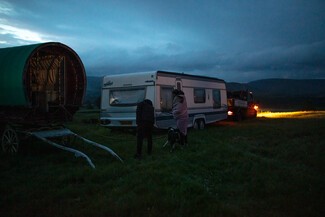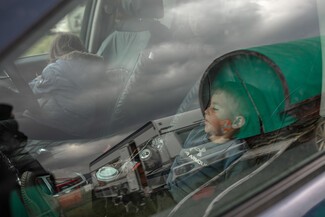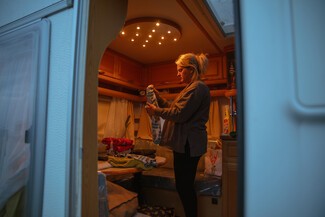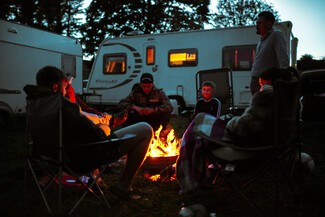“We’re Not Allowed to Be Ourselves Anymore” - The Harsh Reality of Life on the Road for a Nomadic Romany Family

(All photographs are of Traveller families at stopping places on the way to Appleby Fair 2024)
For centuries, Romany families have lived nomadically across Britain, moving from place to place, following work, visiting family, and maintaining a way of life rooted in freedom, movement, and tradition. But today, that way of life is under siege.
Drive2Survive is a national, community-led organisation run by Gypsy and Traveller people, for Gypsy and Traveller people. We gather testimonies, campaign for change, and fight back against the growing wave of criminalisation and hostility facing our communities.
Over the past few years, we have heard devastating testimonies from families across the country, describing how hard life on the road has become — and how their very identity is being stripped away.
A Personal Connection
Through mutual friends, I heard the story of one nomadic Romany family who were struggling under the weight of hostile laws, constant movement, and exhaustion. I reached out and asked if they would be willing to share their experiences with me as part of Drive2Survive’s work.
When we met, as is custom when Gypsies meet for the first time, we began with the usual introductions — “who are you off?” — tracing our family trees and connections. To our surprise, we discovered we were distant relatives. Though we had never met before, that bond was instantly there, layered into our conversation as we spoke about their life, their struggles, and their hopes.
I listened as they described their life on the road — how they were run up the road again and again, sometimes within an hour of pulling onto a piece of ground. Since the introduction of the Police, Crime, Sentencing and Courts (PCSC) Act, families like theirs have faced harsher policing, new powers to seize vehicles, and an environment where stopping anywhere, even temporarily, can lead to threats, fines, or criminal charges.
One night, they told me, they were forced to keep driving for 24 hours straight because there was nowhere safe or legal to stop. The children had to sleep crammed in the car, instead of resting properly in their beds in the trailer. The mother spoke quietly but powerfully about the heartbreak of not being able to cook for her children or put them to bed. “I just kept moving,” she said, “because we had no choice.”

The Cost of Survival
Eventually, desperate and exhausted, the family pooled everything they had to buy a small piece of land. They now live there, seeking planning permission and hoping to create a legal site. They are supported by GaTEssex, the local community-led organisation for Gypsies and Travellers in Essex. GaTEssex provides vital advocacy, support, and guidance, helping families navigate the often hostile planning system, challenge discrimination, and access essential services.
Sitting with this family was deeply emotional. The father, who had been born on the road and spent his entire life travelling, spoke of his longing to teach his children the same ways his parents and grandparents taught him. But with laws tightening around them, he felt the grief of a culture being cut away.
His unease at being in one place was visible in his eyes. “I’m grieving for the way of life we’ve lost,” he told me. “It’s not just how we live — it’s who we are.”
A Grief That’s Personal
As I drove home from that meeting, I wept for them. Their pain, their grief, and their resilience stayed with me in every mile. It was not just the story of any Traveller family — it was the story of my people, my distant relatives, who I had only just met but immediately felt connected to.
The trauma they carry is not abstract — it’s living, breathing, and heavy on their backs every day. It is the trauma of being told, by law and by society, that your very way of life is unacceptable. That your cultural inheritance — the freedom to travel, to gather, to live nomadically — is no longer allowed.

The Bigger Picture
This family’s experience is not unique. Across the country, families are being forced off the road and into fixed places — sometimes into bricks-and-mortar housing, sometimes onto precarious pieces of land where they must fight drawn-out legal battles to stay. The cultural and emotional impact of this forced settlement is profound, affecting not only daily living but the survival of a centuries-old culture.
Drive2Survive is working hard to document these stories, amplify these voices, and challenge the hostile legislation that targets nomadic communities. We work alongside local organisations like GaTEssex to offer families practical support — but we also stand up and say loudly that this is not just a question of land or parking. It is a question of survival, dignity, and cultural identity.
A Call for Understanding
When we listen to the testimonies of Romany and Traveller families, we hear not just stories of hardship, but of strength, resilience, and deep-rooted love for their way of life. But we also hear a warning: unless we act, unless society changes, we are witnessing the systematic erasure of a culture.
Gypsy and Traveller families are not outsiders or criminals. We are people with rich histories, vibrant cultures, and deep family bonds. And we deserve respect, space, and the freedom to be who we are.
Drive2Survive and GaTEssex will continue to stand alongside families like this one, fighting for their rights, supporting their journeys, and reminding the world that we are still here — and we are not giving up.

By Claire Rice, Project Coordinator for Drive2Survive and Project Coordinator for GaTEssex
(Photographs: Families at stopping places on the way to Appleby Fair 2024 © Eszter Halasi)
About the author
Claire Rice is a housed Romany Gypsy from Essex, serving as Project Coordinator for Drive2Survive and GaTEssex. Her work focuses on supporting, amplifying, and advocating for Gypsy and Traveller families facing the challenges of systemic discrimination, hostile legislation, and cultural erasure. This article is written not just as a professional but as a member of the community, sharing the voices of her own people.